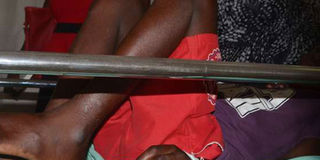Silent tears: How Kenya’s boys are battling a sexual violence crisis

A boy recuperating in hospital after being abused by close relatives. A rights group wants April 16, declared 'World Day of Zero Tolerance for Sexual Violence against Boys.'
What you need to know:
- Rising sexual violence against boys in Kenya sparks awareness campaign, challenging stigma, promoting justice, and demanding global recognition.
- Despite alarming statistics, sexual abuse against boys remains underreported; new efforts aim to support survivors and reform gender norms.
They suffer in silence, their trauma hidden behind veils of shame and societal indifference. In Kenya's bustling capital, a disturbing reality lurks beneath the surface – one that has long been overlooked in conversations about gender violence.
A 2022 government report revealed a shocking statistic: more than 200 boys had been sodomised in Nairobi alone. According to the Kenya Health Information System report, 121 boys under the age of 11 and 87 others aged 12-17 had been sexually abused, exposing the alarming rise of sexual violence against male children in major urban centres across the country.
These numbers, however devastating, represent only the tip of the iceberg. Many cases go unreported as victims remain silent, fearing stigma and societal judgment. It's this pervasive silence that child rights advocates are determined to break as the world marks Sexual Assault Awareness Month.
Pendekezo Letu, an organisation advocating for vulnerable children through capacity building on child rights and protection, is spearheading a campaign to shed light on this often-neglected issue. The advocacy group is challenging harmful gender norms while fostering open dialogue about male sexual abuse – a topic rarely discussed in public forums.
The child welfare organisation is also pushing for justice and support for survivors by advocating for accessible, effective, and safety services tailored specifically to the needs of male victims. Through its campaign, the group is calling for greater investment in research to support the development of evidence-based policies addressing survivors' needs.
This initiative further fosters global solidarity and urges member countries to implement mechanisms for follow-up actions to combat sexual violence against boys. The advocacy effort is leading a global appeal, petitioning the United Nations to declare April 16 of every year as an international campaign day dedicated to protecting boys from sexual violence – a campaign that has been running since 2021.
"Many boys are victims of sexual violence but opt to stay silent," says Francis Kimathi, program officer at the child rights organisation. "We believe protecting boys from sexual violence completes and strengthens efforts being made to prevent violence against all children, including girls," he told Nation.Africa.
Since its inception, the Family Blue Umbrella Day campaign has been raising awareness to ensure fewer boys face sexual abuse. In 2024, the global campaign reached over a million people, including men and boys who have suffered childhood sexual violence.
Kimathi notes that among the campaign's key priorities is sensitising boys about reporting pathways.
"We have had cases of sodomy increase tremendously in recent times, more so here in Nairobi. This campaign is meant to break the barriers and ensure that those boys who go through sexual violence report and have access to help," he explains.
The severity of the issue is underscored by a study titled Childhood Sexual Violence against Boys and released by Together for Girls. The research reveals that 65 per cent of incidents of sexual violence against boys in Kenya occur in perpetrators' or victims' homes. The study further indicates that victims experience more health problems, including sexually transmitted infections, anxiety, depression, and suicidal thoughts, compared to non-victims.
The research also found that victims reported more attitudes favourable to violence against women than non-victims and were more likely to engage in transactional sex. Globally, the organisation reports that in the past 12 months, 69 million boys have experienced sexual violence.
The crisis extends beyond peaceful regions. Data released by Women's Refugee Commission on sexual violence against men and boys in conflict and displacement shows the vice is widespread in conflict zones.
Research conducted in Myanmar, Libya, DRC, and South Sudan revealed that boys and men were subjected to various forms of conflict-related sexual violence, including forced witnessing, genital violence, and anal rape.
The commission's findings indicate that sexual violence against males often occurs at border crossings, roadsides, during village raids, and in imprisonment or captivity. Groups particularly vulnerable to victimisation include adolescent boys, young men, and detainees.
